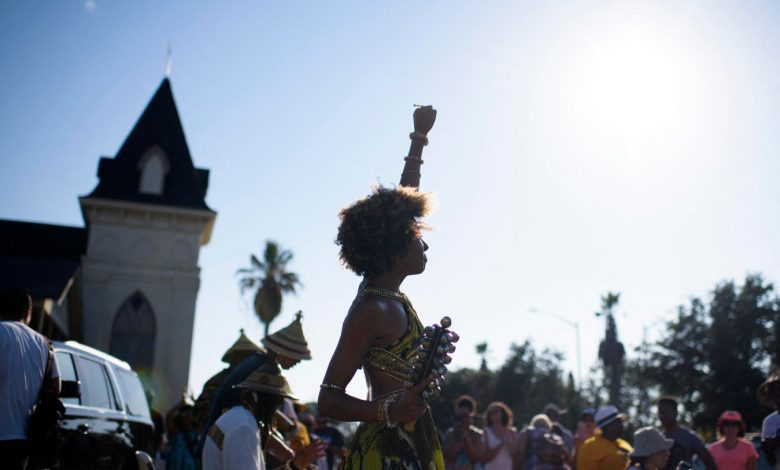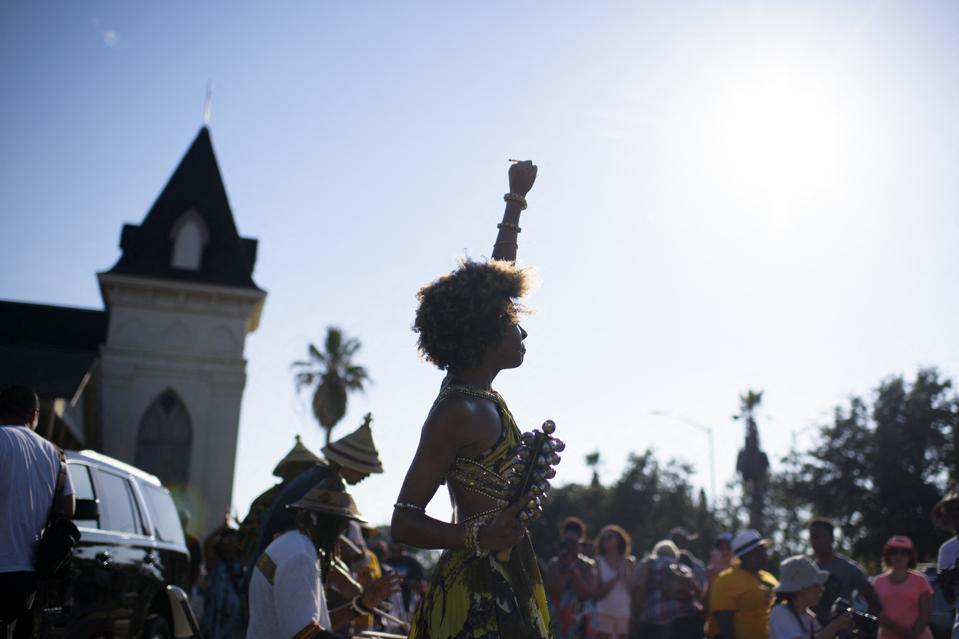160 Years After Juneteenth, Houston Leaders Reclaim The Freedom To Build

Juneteenth re-enactment celebration in Galveston, Texas.
When the Union Army arrived in Galveston, Texas on June 19, 1865 — two and a half years after the Emancipation Proclamation went into effect on Jauary 1, 1863 — the message they carried freed over 250,000 enslaved African Americans in Texas. That day, now celebrated as Juneteenth, stands not only as a powerful reminder of delayed justice but also as a call to continue the fight for equity, opportunity and liberation.
While chattel slavery was legally abolished, African Americans continued to endure systemic oppression through laws like the Black Codes, which restricted basic rights such as earning fair wages and owning property. These post-emancipation barriers combined with generations of racial and economic discrimination contributed to today’s racial wealth gap where Black households rank the highest in facing wealth deficits or indebtedness.
Today, just 50 miles from Galveston Island, two community leaders are helping to carry that torch of freedom forward through affordable housing, wealth creation, and economic development. In Houston, President & CEO Marlon Mitchell of Houston Business Development, Inc. (HBDi) and Owner Malcolm Sykes of Private Leverage are building the infrastructure for long-term freedom by creating pathways to homeownership and small business success in historically excluded Black neighborhoods.
Driven by its Houston roots, Private Leverage holds economic equity as its central commitment. As a Community Development Financial Institution, Private Leverage has committed over $25 million in capital to low-to-moderate income neighborhoods across Texas, supporting minority real estate developers who rehabilitate and produce housing in these communities. In addition, minority-owned small businesses can access loans to help finance and secure their operating spaces, further strengthening local economic growth.
In 2023, homeownership rates in the greater Houston area revealed significant disparities: approximately 72% of White and Asian American households owned their homes, compared to 55% of Hispanic households and just 42% of Black households. Similarly, in 2021, only 4.7% of small business owners in the region were Black, while 11.2% were Hispanic and 57.2% were White.
Through residential, commercial, and small business loans, Private Leverage is addressing these gaps and working towards equitable balance by circulating money within Black communities through support of Black-owned businesses, thereby increasing financial velocity. To date, Private Leverage has closed 112 small business loans with 99% to CDFI Eligible Markets. In total 75% of its dollars benefitted CDFI Investment Areas, and 55% High Poverty Areas. The organization recognizes that its work often leads to the creation of Naturally Occurring Affordable Housing (NOAH). Sykes emphasized the importance of building capacity to help borrowers track the creation of affordable homeownership and rental units and, where possible, to establish affordability agreements that ensure these homes remain affordable in the long term.
“Juneteenth, both personally and professionally, signifies the ongoing quest for freedom, justice, and equality,” said Sykes. “Daily, we commit to advancing towards our objectives, with ultimate freedom as the paramount goal. While legal bondage has ended, the pursuit of genuine freedom persists.”
At HBDi, Mitchell is tackling the same stark disparities through a multi-pronged approach. The organization revitalizes underutilized properties to expand affordable and mixed-income housing, provides loans and technical assistance to minority-owned small businesses as a certified CDFI, and supports entrepreneurs through business incubation programs. Additionally, HBDi offers commercial and co-working spaces to help local businesses thrive and leads adaptive reuse and redevelopment projects that drive neighborhood revitalization.
Since its founding in 1986, HBDi has facilitated over $350 million in small business loans and grants, resulting in the creation of approximately 5,000 jobs for citizens in the Houston Metro area, of which 75% have been to Black businesses. To support the development and preservation of affordable housing and community facilities, HBDi spearheaded the renovation of Houston’s Palm Center, a twenty-two-acre site that hosts more than 50 small businesses, government agencies, and nonprofit organizations – catalyzing $26 million in economic development, affordable housing projects, and the creation of 400 jobs.
According to a Brookings research report, Black business ownership is currently growing at a rate of about 4.72% annually. At that pace, it would take 256 years for the number of Black-owned businesses to reflect the percentage of Black people in the U.S. population. Yet, despite the magnitude of the racial wealth gap and the long road to parity, HBDi is actively investing in the future by advancing $66 million in single-family, multi-family, and adaptive reuse projects aimed at accelerating Black wealth-building and economic opportunity.
“The legacy of Juneteenth reminds us that justice and opportunity have never arrived on time for Black communities—and that we must be both vigilant and proactive in creating creative economic opportunities within our communities,” said Mitchell. “As Galveston’s neighbor and the most populous city in Texas, Houston has long been a place where African American communities have fought for—and created—economic opportunity against the odds. Our work at HBDi is an extension of that legacy.”
Looking back 160 years ago, the thought of African Americans leading financial institutions that drive affordable housing and wealth creation was nearly unimaginable. This Juneteenth serves as a powerful reminder of how far we’ve come against great odds and a call to action to continue investing in the lasting prosperity of Black communities. Yet the data shows that African Americans lag in wealth and housing ownership, last in both categories. I submit that current national policies will erode African Americans past economic gains. If not careful, the losses will be so great that it will take decades to recapture current economic progress.
The times call for radical efforts and bold leadership to ensure the challenges of the times are met. If not, history could repeat itself.





